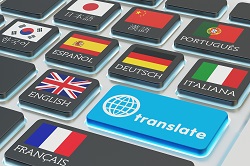Machine translation now better than ever
Not long ago, the advent of automatic translation between languages was likened to something out of a science fiction novel. Today, online translations based on artificial intelligence have come a long way, thanks to neural MT technology which has been widely adopted by the translation industry to produce high-quality translations. Nonetheless, limitations remain as different user groups might use specific terminology linked to different fields and interests. The EU-funded MMT project – which stands for ModernMT – found a way to overcome these limitations. It designed a commercial online translation service that can train itself to improve translations significantly based on user feedback, regardless of subject matter and language. “We developed a new open-source machine translation software that consolidates the current state-of-the-art MT technology into a single and easy-to-use product,” says Davide Caroselli, Vice President of Products at the start-up developing and commercialising MMT technology. “ModernMT adapts to the context in real time while learning and evolving through interaction with users, increasing MT-output utility for the translator in a real professional environment,” he adds. In more technical terms, this is achieved by augmenting a generic neural MT system with an internal dynamic memory and storing all available user translation memories. “When ModernMT receives a translation query, it quickly analyses its context, recalls the most relevant translation examples from its memory, and instantly adapts its neural network to the query,” explains Caroselli. Better, more cost-effective translations Importantly, MMT’s adaptation approach has successfully delivered the translation quality of customised MT with the same maintenance costs of a readily available generic system. “Thanks to careful optimisation, the whole adaptation process, which is run for every sentence, just takes a fraction of second,” reveals Caroselli. Moreover, experiments have shown that the MMT context-based and memory-based adaptation method has a positive impact on the translation of terminology. One of ModernMT’s key advantages is that it can be easily integrated into current translation platforms, including the best available neural MTtechnology. “Our initial tests show higher quality translations compared to Google Translate and DeepL, the leading MT systems on the market,” says Caroselli. He notes that ModernMT performs particularly well on European languages such as Dutch, English, French, German, Italian and Spanish, and generally when it can adapt to contextual information. In effect, MMT has developed more accurate MT that is specifically built for translation providers. “Rather than using generic engines, translation providers can enjoy state-of-the-art machine translation technology based on neural networks and with the unique ability to adapt to context on the fly,” highlights Caroselli. “The solution is available as open-source software and as software as a service, using the best technology and backed by top researchers and software engineers in the field,” he adds. Commercialisation going full steam ahead Thanks to the start-up launched specifically to continue developing the product and commercialising it, also called ModernMT, the future looks bright for accurate automated translation. While translation companies can install the ModernMT solution on-premises or use it in conjunction with computer-assisted translation tools, large enterprises that want in-house capabilities for MT can use the open-source solution or buy tailor-made systems. In parallel, freelance translators can also benefit from ModernMT via plugins for MateCat and SDL Trados Studio. The product has already started making waves on the market. “ModernMT has closed contracts with TranslateMedia – a large language service provider based in the UK with focus on technology and translation quality,” says Caroselli. The company has also teamed up with MyMemory, the translation memory cloud service from Translated. Enthusiastic early-adopter professional translators who use ModernMT through its MateCat plugin have also climbed aboard, while other large enterprises are interested in launching pilot projects to showcase the solution. MT has finally come of age.
Keywords
MMT, translation, ModernMT, machine translation, language, neural MT, translator, artificial intelligence



